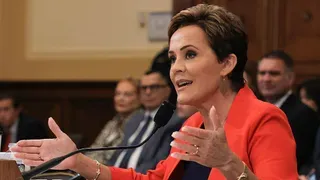August 21, 2013
Businesses, Groups Target Indiana Gay Marriage Ban
Bobby McGuire READ TIME: 3 MIN.
INDIANAPOLIS -- A coalition of businesses and activist groups who launched a push Wednesday to defeat an amendment that would write Indiana's same-sex marriage ban into the state constitution warned that if it passes it would set the state back and undermine the rights of its gay and lesbian residents.
The push by the new Freedom Indiana coalition heralds an expected battle in Indiana's next legislative session, not just between same-sex marriage opponents and gay rights advocates, but also big corporations who contend such a ban would be bad for business .
More than 200 people, some holding blue signs reading "Liberty for All Hoosiers," filled downtown Indianapolis' Artsgarden for the lunch-hour announcement of the new group.
Two of Indiana's top employers - Indianapolis-based drugmaker Eli Lilly and Co., and Columbus-based engine manufacturer Cummins Inc. - are among its members, along with Indiana Equality Action, Freedom to Marry, the American Civil Liberties Union of Indiana and other activist groups.
Freedom Indiana's campaign manager is Megan Robertson, a Republican who ran U.S. Rep. Luke Messer's successful 2012 campaign to win the eastern Indiana seat Rep. Mike Pence vacated to run for governor. She said the coalition's push to defeat the amendment in the state's Republican-controlled Legislature will be a bipartisan effort.
Robertson said lawmakers would be hearing in the next legislative session from many Republicans who oppose the amendment, which she said would threaten the rights of gay and lesbian residents and harm Indiana's reputation.
"We want to make sure all Hoosiers enjoy liberty and freedom. It doesn't matter whether you're straight or gay, male or female, young or old, rural or urban, Republican, Democrat or Libertarian," Robertson told the gathering.
She said the amendment is unnecessary because Indiana law already defines marriage as between a man and woman.
Indiana lawmakers passed the amendment in 2011, but they must pass it a second time in 2014 in order to put it to voters for a statewide referendum. Indiana voters would have to approve the amendment for it to be added to the state's constitution.
Indiana is the latest state to consider adding a gay marriage ban into its constitution. North Carolina voters approved a constitutional amendment banning gay marriage in May 2012.
Supporters of the bans say placing them in state constitutions makes it harder for future lawmakers to undo laws against same-sex marriages. But opponents argue such bans paint states as unfriendly places to do business.
Eli Lilly's director of corporate responsibility, Robert Smith, said passage of the amendment would hamper efforts by businesses in the competitive life sciences industry to recruit "the very best and brightest" employees from around the world.
"We want Indiana to be an attractive place to live and a wonderful place to do business. And we want those outside our state to view Indiana in the same way," Smith said.
One supporter of the constitutional amendment said there's no evidence a same-sex marriage amendment would harm Indiana corporations.
Micah Clark, executive director of the American Family Association of Indiana, said same-sex marriage supporters use that as "a scare tactic" to shift the spotlight away for what he called the "real issue" of supporting traditional marriage.
"They attempt to pit economic fears against the needs of children and society provided by natural marriage," Clark said in an email.
Among Freedom Indiana's supporters at Wednesday announcement was Jacob Balash, a 36-year-old from the southern Indiana city of Spencer who brought along he and his husband's 8-month-old son, Truman.
Balash said he and his husband, Jonathan Balash, married in New York City two years ago after 10 years together, but they worry that if Indiana's amendment passes it could threaten he and Truman's medical benefits through Jonathan's employer.
The amendment would also cast Indiana in a very unflattering light, he said.
"It will make the state seem more backward, less advanced and we already have that stereotype. It will help cement that in people's minds," Balash said.



